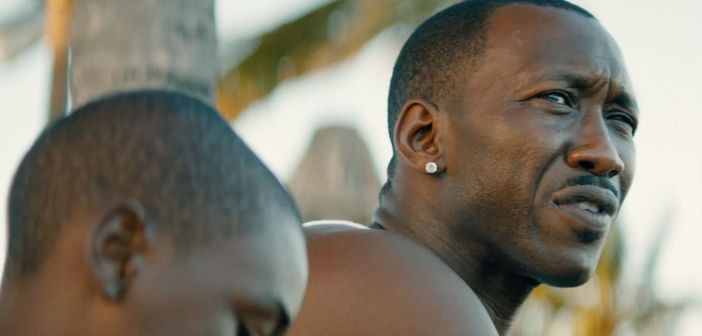Film Review | Oscar Favourite Moonlight Shines with Heart and Empathy in the Face of Cultural Boundaries
*Contains mild plot details*
Describing what happens in Barry Jenkins’ Moonlight is like trying to recount a dream: you can relate the events which transpired but they’re not really what made an impression in the first place. After the film ends, what will remain with the viewer is it’s texture, tone and bittersweet atmosphere of melancholy. This is an unashamedly sensory film, attuned to the sound of the sea or the touch of a hand.
Based on Tarell Alvin McCraney’s play In Moonlight Black Boys Look Blue, Moonlight recounts three stages in the life of Chiron who is played as a child by Alex Hibbert, as an adolescent by Ashton Sanders and as an adult by Trevante Rhodes. In spite of some obvious physical dissimilarities between these three actors, Jenkins manages to create a continuum of character throughout Chiron’s life. We see him grow from a diminutive youngster, picked on by his peers and given the demeaning nickname ‘Little’, into a burly gangster. And yet he retains a guardedness all the way through, hungry for human connection but unsure of how to proceed.
When we first meet Chiron, he’s being pursued by a group of boys only to be rescued by local drug dealer Juan (a standout performance by Mahershala Ali). It’s apparent that Chiron is not used to such acts of kindness but Juan manages to gradually gain his trust, eventually becoming a sort of surrogate father to the boy. Their relationship is a respite for Chiron, away from his drug addicted mother Paula (Naomie Harris) and his bullying schoolmates, with Juan providing a model of tender masculinity which marks him for life.

We also see Chiron come to terms with his own sexuality, as he navigates a fraught path in the projects of Miami’s Liberty City. This scenario could be played for easy sentiment or cheap drama but Jenkins handles the material wonderfully, creating a nuanced, multi-layered world and allowing us to empathize with each of the characters in turn. Not only is Juan a surprisingly nurturing presence but Chiron’s mother also eschews the typical cinematic portrayals of addiction. Paula can alternate from being frighteningly spiteful one moment to tender and loving the next.
As a teenager, Chrion’s harassment at school intensifies and Paula’s behaviour becomes even more unstable but he also finds his feelings reciprocated by his best friend Kevin as they share a night of intimacy on a moonlit beach. However this is a rare moment of requited passion for Chiron, whose desires have to remain covert, hidden beneath a seemingly impassive front. Moonlight constantly interrogates ideas of masculinity as Chiron tries to traverse the codes of conduct for black men in the projects. In the final section he appears to have succumbed to a cliched destiny and ends up adopting a sort of hyper-tough gangster persona, complete with a golden grill over his teeth. But a reunion meeting with Kevin reveals this to be a paper-thin facade. ‘Little’ may have toughened up his outward appearance but in the presence of his former love, this all falls away: he’s as reticent and shy as ever.
Ultimately Moonlight is a film about acts of kindness, whether they are embraced, refused or offered too late. Jenkins has created a film about identities that are often marginalised in mainstream cinema and had done so with style, intelligence and empathy.
Moonlight is in cinemas from February 17th. Check out the trailer below.
[arve url=”https://www.youtube.com/watch?v=9NJj12tJzqc&t=1s”]
Featured Image Credit

